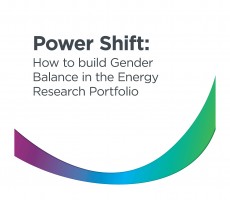These pages set out our wider thinking on issues relating to innovation, governance and practice for a sustainable, secure and affordable energy system.
New Thinking
-
The significance of Parliament’s Citizens Assembly on net zero

Viewpoint: The significance of Parliament’s Citizens Assembly on net zero By Dr Matthew Lockwood, Senior Lecturer in Energy Policy, SPRU 20th June 2019 The announcement today from six House of Commons Select Committees that they are to hold a Citizens Assembly (CA) on how we might achieve a pathway to net zero emissions is a major step. The move is clearly inspired by (and made under pressure from) the upsurge of activism on climate change – school strikes, Extinction Rebellion protests, the resurgence of the Green New Deal and the declaration by numerous institutions, including Parliament,
Read More » -
Building gender balance in the energy research portfolio

How to build gender balance in the energy research portfolio – we need a Power Shift Basia Cieszewska, Jess Britton, Julie Smith, 17th June 2016 The challenge of rapidly decarbonising our energy system can’t be addressed if only half of the population is involved. Unfortunately it’s old news that women are significantly underrepresented in Science, Technology, Engineering and Maths (STEM) subjects, with the UK having the lowest proportion of female engineers in the EU[1]. Across all academic disciplines women account for 58% of Postgraduate students but only 25% of Professors[2]. Chris Skidmore, Minister of State
Read More » -
New Thinking: Where is IGov on net zero?

Where is IGov on Net Zero? Catherine Mitchell – IGov Team, 3rd May 2019 Given all the discussion over the last few days about when the UK and the world should reach net zero, we thought IGov should be clear on where we stand. The CCC has said that the UK ‘should set and vigorously pursue an ambitious target to reduce greenhouse gas emissions (GHGs) to ‘net-zero’ by 2050, ending the UK’s contribution to global warming within 30 years. Reflecting their respective circumstances, Scotland should set a net-zero GHG target for 2045 and Wales should
Read More » -
New Thinking: we have a plan

We have a plan – good governance to achieve a net-zero target Rebecca Willis and Catherine Mitchell, 2nd May 2019 This morning, the Committee on Climate Change recommended that the UK should strengthen its climate change targets, to move Britain to net-zero carbon by mid-Century. The advice, coming the day after the UK Parliament voted to declare a ‘climate emergency’, provides welcome evidence that far-reaching climate action is both feasible and economically sound. Throughout the report, the CCC stresses the crucial role of policy and governance in achieving a transition to zero-carbon. The target will,
Read More » -
New Thinking: GB Policy Conservatism – we are in the vicious policy cycle phase

GB Policy Conservatism – we are in the vicious policy cycle phase Catherine Mitchell – IGov Team, 15th February 2019 Anyone who has read anything that IGov has produced over the last 6 years knows that we argue that GB energy governance, of which energy policy is one part, is not fit for purpose. And on this day of striking schoolchildren and students, it increasingly seems to me that it is not just our infrastructure, regulation, policy and markets which are unfit for purpose but the really big problem is that Britain does not seem
Read More » -
New Thinking: Simplifying energy governance to help the UK’s path to zero-carbon

Simplifying energy governance to help the UK’s path to zero-carbon Rebecca Willis, IGov Team, 25th January 2019 The UK’s Climate Change Act sets an admirably simple, legally-binding framework for carbon reduction. The targets are clear. Yet the means to achieve them are opaque. As the government considers strengthening the UK’s targets, and moving toward net-zero greenhouse gas emissions by 2050, the IGov project has offered evidence to the Committee on Climate Change on governance of the energy system. Pointing out the multiple, confusing institutions, policies and timeframes that characterise energy governance, IGov argue that
Read More » -
New Thinking: The changing role of cities & local energy

The changing role of cities and local energy – does energy system governance need to catch up? Jess Britton, IGov Team, 26th November 2018 It is now widely accepted that the transformation of the UK energy system is well underway with changes to technologies and business models, as well as evolving consumer preferences, challenging many of the principles and structures of the existing centralised and supply focussed energy system. At the same time there is growing consensus that local approaches to energy system change are becoming more important. This blog reviews the changing focus in
Read More » -
New Thinking: Fuel poverty indicator letting down poorer households

Fuel poverty indicator letting down poorer households Helen Poulter, 23rd Novermber 2018 Now we are in autumn, with winter and Christmas fast approaching, it’s time to batten down the hatches and keep warm and snug in our homes. A lovely time of year for some but not necessarily for those on a low income. Shorter days and lower temperatures mean increased energy costs. There are 3.5 million (12.9%) households in the UK affected by fuel poverty. The purpose of this blog is to show that the current way of assessing the fuel poor via averaged
Read More » -
Women and Energy in Academia

Women and Energy in Academia Catherine Mitchell, 29th October 2018 The recent BIEE Summer Conference had a morning breakfast session on women and energy (organised by Karoline Rogge of Sussex), and the talks can be listened to here. We speakers were all asked to answer three questions in relation to our experiences: Juliet Davenport talked about the importance of certain types of business management models; Vivien Geard from BEIS talked about public service; I concentrated on what it has been like for me in academia; and Barbara Vest from Energy UK, ably, chaired it. Since
Read More » -
Presentation: Issues for GB Energy Policy and the IPCC

Issues for GB Energy Policy and the IPCC From: Catherine Mitchell Lecture to: DTU Energy Engineering, 23rd October 2018 This presentation can be found here: CM DTU GB Energy Policy_
Read More »






